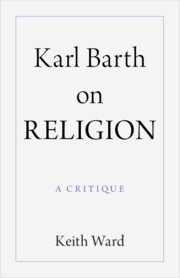Book contents
- Karl Barth on Religion
- Karl Barth on Religion
- Copyright page
- Contents
- 1 Revelation as Sublimation
- 2 Barth’s Theology of Religion
- 3 The Revolt against Liberalism
- 4 The Nature of Revelation
- 5 Revelation against Religion
- 6 The Failure of Religion
- 7 The Failure of Philosophy
- 8 Religion and Truth
- 9 Universal Grace
- Select Bibliography
- Index
4 - The Nature of Revelation
Published online by Cambridge University Press: 14 November 2024
- Karl Barth on Religion
- Karl Barth on Religion
- Copyright page
- Contents
- 1 Revelation as Sublimation
- 2 Barth’s Theology of Religion
- 3 The Revolt against Liberalism
- 4 The Nature of Revelation
- 5 Revelation against Religion
- 6 The Failure of Religion
- 7 The Failure of Philosophy
- 8 Religion and Truth
- 9 Universal Grace
- Select Bibliography
- Index
Summary
Ninian Smart’s seven dimensions of religion, of which truth is only one. There are alleged truths in religion, but it is misleading to say that religions can be true.
Most religions have some idea of revelation or authoritative teaching, but they are very different.
Barth’s view of revelation as God-given, certain, and absolutely authoritative. But revelation is a complex process, involving experience, interpretation, and debate.
Revelation comes to few, is expressed in diverse cultural forms, and is always disputable and disputed.
The Old Testament is part of Christian revelation, but has given rise to different religions and sects.
Barth sees the Hebrew Bible as an incomplete revelation, which was later rejected.
Diverse Interpretations of revelation show that human speculation and reasoning is involved.
The idea of sublimation is not helpful in explaining the alleged difference between religion and revelation.
Keywords
- Type
- Chapter
- Information
- Karl Barth on ReligionA Critique, pp. 61 - 76Publisher: Cambridge University PressPrint publication year: 2024

